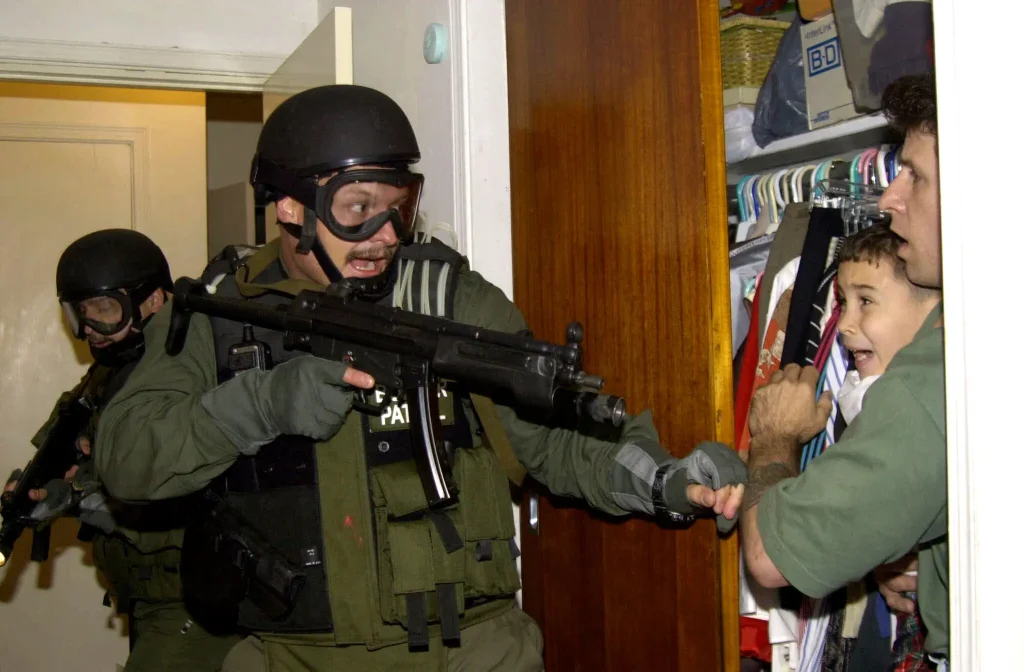
Today (April 22, 2023) is the 23rd anniversary of the day when the Clinton Administration seized a six year old boy in order to force him back into the slavery that his mother had died trying to escape.
(p. C1) MIAMI BEACH — Elián González, the little Cuban boy at the center of a new play bearing his name, never appears onstage. Instead, audiences hear the sound of a child’s high-pitched giggle, a haunting echo of the events that, more than two decades ago, ripped Miami apart and riveted the nation.
One of three survivors after a storm capsized the small boat carrying his mother and about a dozen others fleeing Cuba, Elián was the center of a monthslong custody battle — his father and the dictator Fidel Castro on one side, Miami relatives and Cuban exiles on the other — that became a proxy for a larger political struggle. After U.S. immigration agents launched a pre-dawn raid in Little Havana to reunite the boy with his father, who ultimately brought him back to Cuba, outraged opponents protested in the streets.
For years, the story’s enduring image has been the dramatic photograph of a terrified 6-year-old boy, cornered by an armed federal agent. Miami New Drama now hopes to broaden that portrait with “Elián,” by the Cuban American playwright Rogelio Martinez, which examines the pain, rage, confu-(p. C4)sion and division that still resonates in a city filled with immigrants.
“Elian was a pivotal event,” said Michel Hausmann, who directed the play and is Miami New Drama’s artistic director. “Let people get upset, let them argue. I think it’s part of our duty as artists.”
. . .
It is all part of Hausmann’s mission to speak to this majority Latino city. A Jewish Venezuelan who left his native country in 2009 amid rising antisemitism and attacks on his Caracas theater troupe from the socialist government, he has commissioned multiple popular plays centered on the Cuban American and Venezuelan communities.
. . .
Enraged by the U.S. government’s actions, thousands of Cuban Americans switched from Democrat to Republican in what they called “el voto castigo” (the punishment vote). It was a crucial shift in an election year, with George W. Bush becoming president after defeating Vice President Al Gore in Florida by 537 votes.
. . .
Martinez, the playwright, has long been interested in politics, with a Cold War trilogy among his plays that have been produced by leading theaters around the country. But with “Elián,” politics became personal.
Martinez’s mother brought him to the United States in the 1980 Mariel boatlift, when he was 9, but avoided telling him that the Cuban authorities were not allowing his father to leave.
“My mom said, ‘We’ll see him next week,’” Martinez said. “Like we’re just going ahead. But as we were getting into the car, my mom said, ‘Go, go back. Go hug your dad.’”
Martinez did not see his father again until he was an adult, and only briefly.
. . .
Diaz, the lawyer and former mayor, was 6 when his mother brought him to Miami in 1961, forced to leave behind his father, a political prisoner. He was deeply wounded by the raid, which the play portrays as a betrayal of an agreement Elián’s relatives in Miami had signed with Reno 12 hours before. His character struggles to reconcile his faith in the system with his feelings as an exile.
“If you forget these things, they can happen again,” the real-life Diaz said. “It was an incredible learning experience,” he added, “to find myself fighting my old country and my new country at the same time.”
. . .
“You are doing great work in presenting this,” a host for Mega TV, Padre Alberto, told Hausmann and Pelaez, his guests from the play. “Elián was very difficult for all of us, and it continues to be very hard to think about, and to make us very emotional.”
Glenda and Dariel Candelario experienced such emotion at a recent performance. The couple, who emigrated from Cuba in 2014, were among the thousands of children forced to attend rallies in Havana demanding Elián’s return. “They didn’t give us any choice,” Glenda Candelario said.
“We had been indoctrinated — we only had the Cuban government part of the story,” said her husband, who was 15 at the time. “I’m so excited to see this now, to hear the other side.”
For the full story, see:
[Note: ellipses added.]
(Note: the online version of the story was updated Nov. 15, 2022, and has the title “Cuban Boy’s Odyssey Is Revisited.” Where the wording differs between versions, the passages quoted above follow the online version.)


I have always felt that it was morally reprehensible for the right-wing leaders of the Cuban exile community to use the plight of the then-five/six year-old lad as a means to rekindle their longstanding political feud against Fidel Castro.